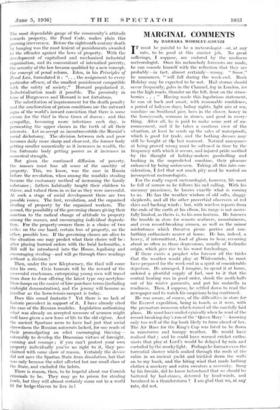MARGINAL commEms
By BARBARA WORSLEY-GOUGH
IT must be painful to be a meteorologist—or, at any rate, to be good at this sinister job. No great sufferings, I suppose, are endured by the mediocre meteorologist. Once his melancholy forecasts are made, he can console himself with the reflection that they are probably—in fact, almost certainly—wrong. "Snow." he announces, "will fall during the week-end. Bank Holiday may be expected to be wet. Hail storms should occur frequently, gales in the Channel, fog in London, ice on the high roads, thunder on the left, frost on the straw- berries . . . " Having made this lugubrious statement, he can sit back and await, with reasonable confidence, a period of halcyon days, balmy nights, light airs at sea, sunshine on Southend pier, bees in the clover, honey in the honeycomb, sermons in stones, and good in every- thing. After all, he is paid to make some sort of an- nouncement, and if he takes a cautious view of the situation, at least he sends up the sales of waterproofs, which is good for trade, and the bathing dresses may still be bought at flip last moment. Natural annoyance at being proved wrong must be softened in time by the frequency with which it. occurs, and injured pride soothed by the thought of holiday-makers gambolling and basking in the unpredicted sunshine, their pleasure enhanced by being unforeseen. Taking all this into con- sideration, 1 feel that not much pity need be wasted on incompetent meteorologists.
For the really expert meteorologist, however, life must be full of sorrow as he follows his sad calling. With his uncanny prescience, he knows exactly what is coming to us. He has the weather wisdom of old salts, shaggy shepherds, and all the other proverbial observers of red skies and backing winds ; but, with wireless reports from the ends of the earth at his elbow, his range is not merci- fully limited, as theirs is, to his own horizon. He foresees the trouble in store for remote seafarers, mountaineers, and even record-breaking airmen, as well as the minor misfortunes which threaten picnic parties and sun- bathing enthusiasts nearer at home. He has, indeed, a heavy, if intermittent, load of gloom to bear, recurring about as often as those depressions, usually of Icelandic origin, which give rise to his worst forebodings.
If there exists a prophet who foresaw all the tricks that the weather would play at Whitsuntide, he must have prepared for the week-end in a spirit of considerable dejection. He arranged, I imagine, to spend it at home, ordered a plentiful supply of fuel, saw to it that the central heating was in good order, shook the moth-balls out of his winter garments, and put his umbrella in readiness. Then, I suppose, he settled down to read the newspaper and to watch his suspicions being confirmed.
He was aware, of course, of the difficulties in store for the Everest expedition, being in touch, as it were, with the premature monsoon which ruined all the carefully laid plans. He must have smiled cynically when hc read of the record-breaking day's run of the Queen Mary '—knowing only too well of the fog bank likely to form ahead of her. The Air Race for the King's Cup was fated to be flown in rainstorms and bumpy weather. He would have realised that ; and he could have warned cricket entlui- siasts that play at Lord's would be delayed by rain and curtailed by the murky light. Perhaps he foresaw even the torrential shower which soaked through the roofs of the cabin in an ancient yacht and trickled down the walls on to my bunk, and the biting wind that made bathing clothes a mockery and extra sweaters a necessity. Snug by his fireside, did he know beforehand that we should be battered by hail-stones, deterred by head-winds, and becalmed in a thunderstorm ? I am glad that we, at any rate, did not.














































 Previous page
Previous page